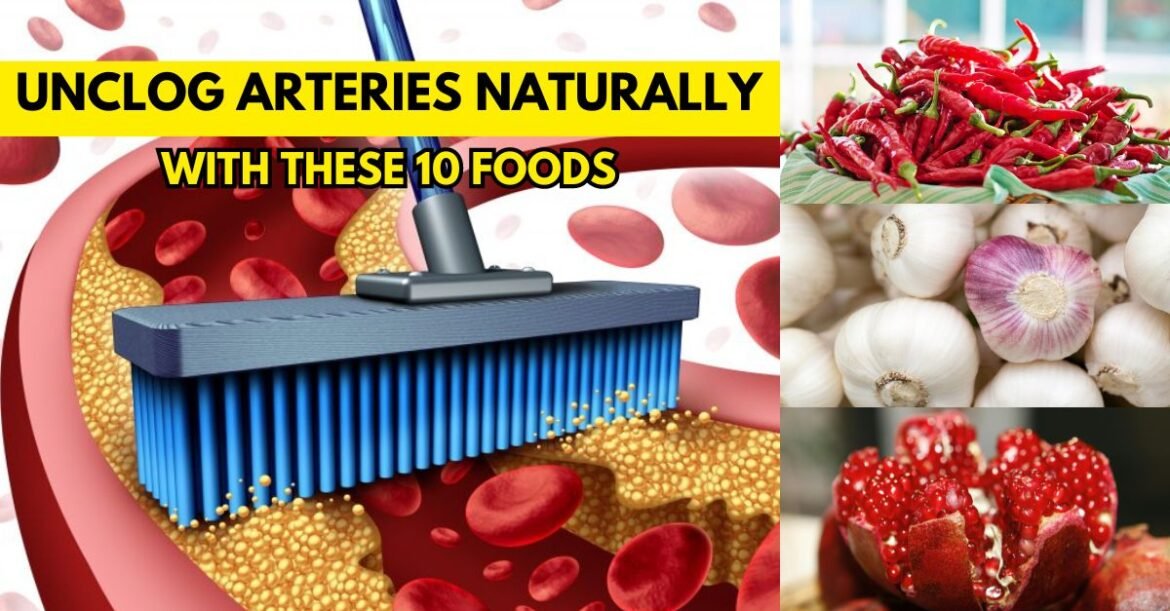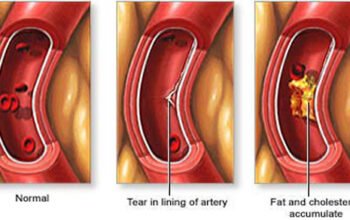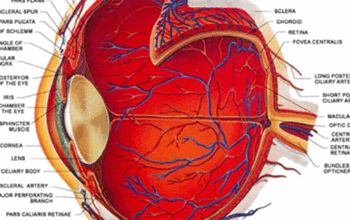Clogged arteries often result from high blood pressure and elevated cholesterol levels. Arteries play a critical role in transporting oxygen-rich blood from the heart to the rest of the body, so it’s essential that they remain flexible, strong, and elastic.
However, when arteries become blocked, it can lead to serious health risks, including atherosclerosis, which is a primary contributor to cardiovascular diseases, heart attacks, strokes, and peripheral vascular disease.
Symptoms of Clogged Arteries
The symptoms of clogged arteries can vary depending on which type of artery is affected:
- Carotid arteries: Blocked arteries in the brain are known as carotid artery disease. Plaque buildup can narrow or obstruct the carotid arteries, potentially leading to stroke-like symptoms. These symptoms may include difficulty breathing, sudden weakness, confusion, severe headaches, loss of coordination, vision problems, and trouble with speech.
- Coronary arteries: Coronary artery disease occurs when the arteries supplying blood to the heart are blocked. This condition may cause symptoms such as chest pain, shortness of breath, and discomfort in areas like the jaw, neck, shoulders, or arms.
- Renal arteries: When the arteries supplying the kidneys are affected, chronic kidney disease can develop. Symptoms may include fatigue, loss of appetite, difficulty concentrating, numbness, or swelling in the extremities, although early stages may not show symptoms.
- Peripheral arteries: Narrowed or blocked arteries in the arms, legs, and pelvis lead to peripheral artery disease, causing pain, numbness, and sometimes difficulty walking.
According to Dr. Axe, arteriosclerosis refers to the thickening and hardening of artery walls due to plaque buildup, and while it’s partly linked to aging, lifestyle choices also play a major role. Over time, cholesterol, fatty acids, and calcium can accumulate, leading to serious health complications such as heart attacks or strokes.
Related post: Blocked Arteries? Watch Out for These 5 Warning Signs!
Several risk factors can accelerate this process, including age, family history, smoking, high blood pressure, high LDL (“bad”) cholesterol, and diabetes. However, incorporating the right foods into your diet can help prevent clogged arteries.
10 Foods for Naturally Clear Arteries
- Garlic
Garlic acts as a natural antibiotic that lowers blood pressure, reduces the risk of heart disease, and helps slow down the progression of atherosclerosis. - Lemon
Rich in vitamin C, lemons help reduce cholesterol, strengthen arteries, reduce inflammation, and inhibit blood clots. - Ginger
Ginger has powerful anti-inflammatory properties that protect against plaque buildup in the arteries and lower cholesterol levels. More on this topic: Eat Ginger for 30 Days and See These 8 Amazing Changes in Your Body! - Pomegranate juice
Packed with antioxidants, pomegranate juice helps prevent the formation of arterial plaque and reduces the risk of atherosclerosis. - Cinnamon
Cinnamon has been shown to reduce total cholesterol, LDL cholesterol, and triglycerides, promoting heart health and preventing atherosclerosis. - Fermented cabbage
Compounds found in fermented cabbage, such as 3-94-hydroxy-3,5-dimethoxyphenyl, have been shown to prevent aortic atherosclerosis and break down harmful chemicals. - Turmeric (Curcumin)
Curcumin, the active compound in turmeric, has long been known for its heart-protective effects. It lowers LDL cholesterol and prevents plaque buildup in the arteries. - Ground flaxseed
Rich in fiber and omega-3 fatty acids, flaxseed supports healthy arteries by lowering blood pressure and fighting inflammation. - Cayenne pepper
Capsaicin, the active ingredient in cayenne, helps reduce LDL cholesterol and decrease the risk of atherosclerosis. - Sesame seeds
Sesame seeds help lower cholesterol levels, reduce arterial plaque formation, and inhibit the development of atherosclerosis.
Additional Heart-Healthy Tips
For optimal heart health, it’s important to maintain a diet rich in healthy fats and fiber, while limiting processed sugars and trans fats. Healthline suggests:
- Add more healthy fats like those found in olives, nuts, avocados, and fish.
- Limit saturated fats by choosing lean meats and incorporating more plant-based meals.
- Increase fiber intake through vegetables, lentils, beans, and oats.
- Cut back on added sugars, which are often found in processed foods, and focus on whole fruits for natural sweetness.
Also, try to increase your intake of heart-healthy foods like coconut oil, chia seeds, avocados, broccoli, and asparagus. Supplements such as vitamins B6, B12, and antioxidants like lutein, vitamin C, and grape seed extract can further support cardiovascular health.
Regular physical activity, including at least 30 minutes of exercise three times a week, is also essential for maintaining clear arteries and overall heart health.
Popular post: Man Slows Alzheimer’s with This Surprising Daily Habit—Doctors Are Stunned!






